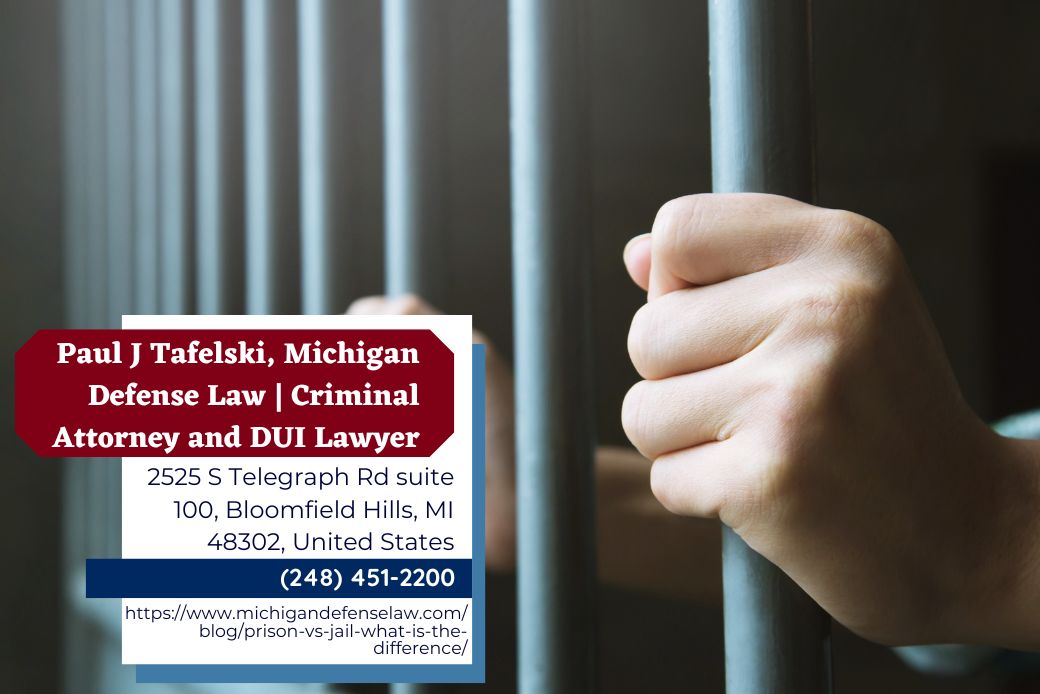Oakland County criminal defense lawyer Paul J. Tafelski (https://www.michigandefenselaw.com/blog/prison-vs-jail-what-is-the-difference/), of Michigan Defense Law, offers crucial insights into the differences between prison and jail. For individuals facing criminal charges, understanding these distinctions is essential for legal strategy and personal planning. Tafelski emphasizes how the environment, length of stay, and the level of rehabilitation programs available in each institution vary, directly affecting those who become part of the system.
When it comes to incarceration, jails and prisons play very distinct roles in the criminal justice system. As the Oakland County criminal defense lawyer explains, “Jails are typically designed for short-term stays, usually less than a year, and are primarily used to hold individuals awaiting trial or sentencing, or those convicted of misdemeanors. Prisons, on the other hand, house individuals convicted of more serious crimes who are serving longer sentences, often exceeding a year.”
According to Oakland County criminal defense lawyer Paul J. Tafelski, the distinction between jail and prison begins with how each facility operates. Jails are typically managed by local governments, such as city or county authorities, and serve as temporary holding centers for individuals during the pre-trial phase. They are integral to the early stages of the legal process, where defendants are either awaiting trial, sentencing, or serving brief sentences for lesser offenses. Prisons, however, are operated by state or federal governments and are intended for long-term incarceration of individuals convicted of serious felonies.
“Knowing the difference between jail and prison can influence how you approach your defense,” says Tafelski. “In jail, you might be dealing with immediate, short-term consequences, while prison represents a much more severe and prolonged punishment. We help our clients understand these nuances so they can make informed decisions about their cases.”
The facilities’ operations reflect their intended purposes. In Oakland County, county jails are vital in managing the pre-trial process, ensuring that individuals are securely held while their legal cases progress. Prisons, on the other hand, serve a different role. They are designed to incarcerate individuals convicted of serious crimes, focusing not only on punishment but also on rehabilitation and eventual reintegration into society.
One of the most striking differences is the level of security and rehabilitation programs available in these institutions. As Tafelski explains, jails offer minimal programs due to the short-term nature of stays. “Jails are primarily concerned with the immediate safety and security of detainees. In contrast, prisons often provide inmates with access to a wide range of programs, such as educational and vocational training, to prepare them for life after release.”
In addition to the disparity in available resources, the security level within each institution varies considerably. Prisons, particularly federal and state facilities, employ multiple levels of security—ranging from minimum to maximum—depending on the severity of the crime and the behavior of the inmates. This structured approach is not typically seen in jails, where the focus is more on temporary detention than long-term confinement.
Oakland County criminal defense lawyer Paul J. Tafelski further explains that the management of inmate turnover differs significantly between the two types of facilities. Jails experience high turnover, with individuals frequently entering and exiting, leading to a constantly shifting environment. Prisons, in contrast, have more stable inmate populations, allowing for structured routines and rehabilitation programs that are better suited to long-term confinement.
Paul J. Tafelski and the team at Michigan Defense Law can offer personalized legal guidance to individuals in Oakland County and beyond. Their goal is to further ensure that clients are not only well-informed about their legal standing but also equipped to make the best possible decisions when facing criminal charges.
About Michigan Defense Law:
Michigan Defense Law, led by Paul J. Tafelski, is a Michigan-based law firm providing top-tier criminal defense services to residents of Oakland County and surrounding areas. With a commitment to protecting the rights of individuals accused of crimes, Michigan Defense Law can offer tailored legal strategies designed to navigate the criminal justice system. The firm can handle a wide range of cases, further ensuring that every client receives dedicated and thorough representation.
Embeds:
Youtube Video: https://www.youtube.com/watch?v=xFw3Esz6Rtc
GMB: https://www.google.com/maps?cid=7441820969606749572
Email and website
Email: paul@michigandefenselaw.com
Website: https://www.michigandefenselaw.com/
Media Contact
Company Name: Michigan Defense Law
Contact Person: Paul J. Tafelski
Email: Send Email
Phone: (248) 451-2200
Address:2525 S Telegraph Rd suite 100
City: Bloomfield Hills
State: Michigan 48302
Country: United States
Website: https://www.michigandefenselaw.com/

